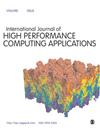电源感知计算研讨会2019特刊介绍——PACO2019
IF 2.5
3区 计算机科学
Q2 COMPUTER SCIENCE, HARDWARE & ARCHITECTURE
International Journal of High Performance Computing Applications
Pub Date : 2021-05-01
DOI:10.1177/10943420211008791
引用次数: 0
摘要
高性能科学计算中的功率意识由于其对二氧化碳排放的贡献不可忽视,从而成为人类主义气候变化的主要驱动因素之一,因此越来越受到人们的关注。例如,这一点得到了绿色500强榜单的认可和推广,该榜单通过测量每瓦的性能来对超级计算机的能效进行排名。在德国教育和研究部(BMBF)资助的2015-2016年联合项目中,马格德堡(德国)的马克斯·普朗克复杂技术系统动力学研究所和蒙得维的亚(乌拉圭)的República大学研究了数值线性代数算法在系统和控制理论中的功耗和能效应用。作为这项工作的一部分,2015年7月6日至7日,在马格德堡举办了第一次“功率感知计算(PACO 2015)”研讨会。PACO 2017后续研讨会于2017年7月5日至8日在德国巴伐利亚州南部的林贝格城堡举行。PACO 2019于2019年11月5日至6日再次在马格德堡举行,是该系列研讨会的第三次,本期特刊专门介绍在该研讨会上发表的研究成果。PACO研讨会的目的和范围包括计算系统中功率或能量节约的发展。利益包括但不限于:本文章由计算机程序翻译,如有差异,请以英文原文为准。
Introduction to the Special Issue related to the Power-Aware Computing Workshop 2019—PACO 2019
Power-awareness in high-performance scientific computing has gained increased interest due to its non-negligible contributions to carbon-dioxide emissions and thus, to one of the main drivers of anthropocenic climate change. This is for instance recognized and popularized by the Green500 list, which ranks the supercomputers from the TOP500 list in terms of energy efficiency by measuring performance per Watt. In a joint project, funded 2015–2016 by the German Ministry of Education and Research (BMBF), the Max Planck Institute for Dynamics of Complex Technical Systems in Magdeburg (Germany) and the Universidad de la República in Montevideo (Uruguay) investigated numerical linear algebra algorithms for applications in systems and control theory with respect to power consumption and energy efficiency. As part of this effort, a first workshop on “Power-Aware Computing (PACO 2015)” was held in Magdeburg, July 6–7, 2015. The follow-up workshop PACO 2017 took place July 5–8, 2017, at Ringberg Castle in the south of Bavaria (Germany). PACO 2019, held November 5–6, 2019, again in Magdeburg, was the third instance in this series of workshops, and this special issue is dedicated to research results presented at this workshop. The aims and scope of the PACO workshops comprise developments in power or energy savings in computational systems. The interests include, but are not strictly limited to:
求助全文
通过发布文献求助,成功后即可免费获取论文全文。
去求助
来源期刊
CiteScore
6.10
自引率
6.50%
发文量
32
审稿时长
>12 weeks
期刊介绍:
With ever increasing pressure for health services in all countries to meet rising demands, improve their quality and efficiency, and to be more accountable; the need for rigorous research and policy analysis has never been greater. The Journal of Health Services Research & Policy presents the latest scientific research, insightful overviews and reflections on underlying issues, and innovative, thought provoking contributions from leading academics and policy-makers. It provides ideas and hope for solving dilemmas that confront all countries.

 求助内容:
求助内容: 应助结果提醒方式:
应助结果提醒方式:


